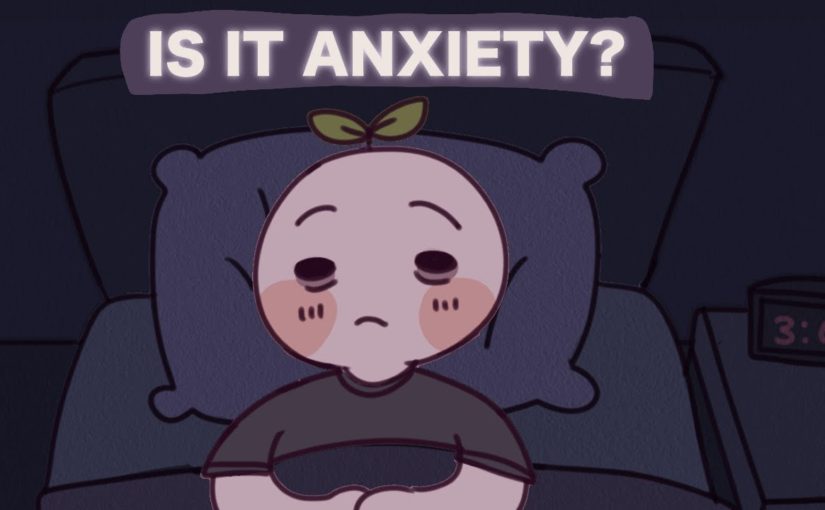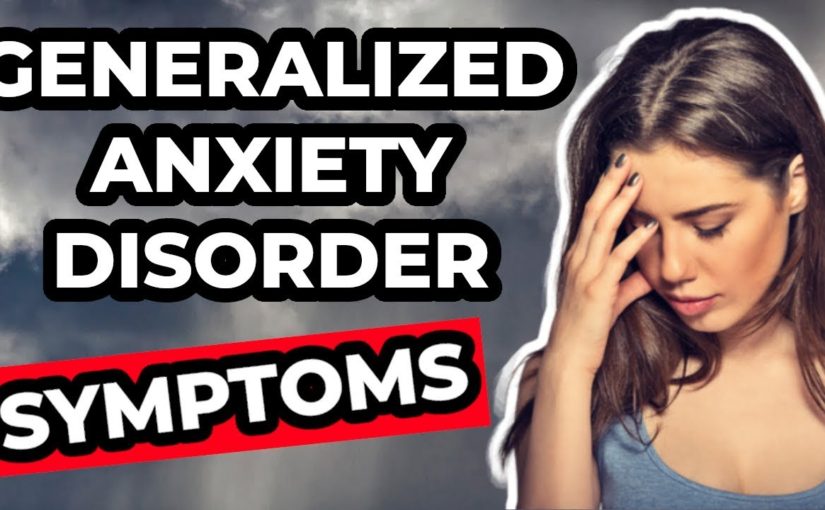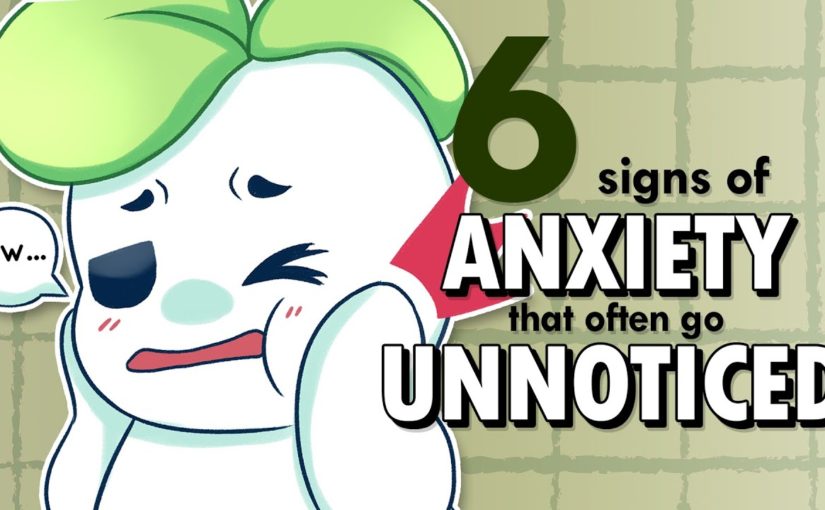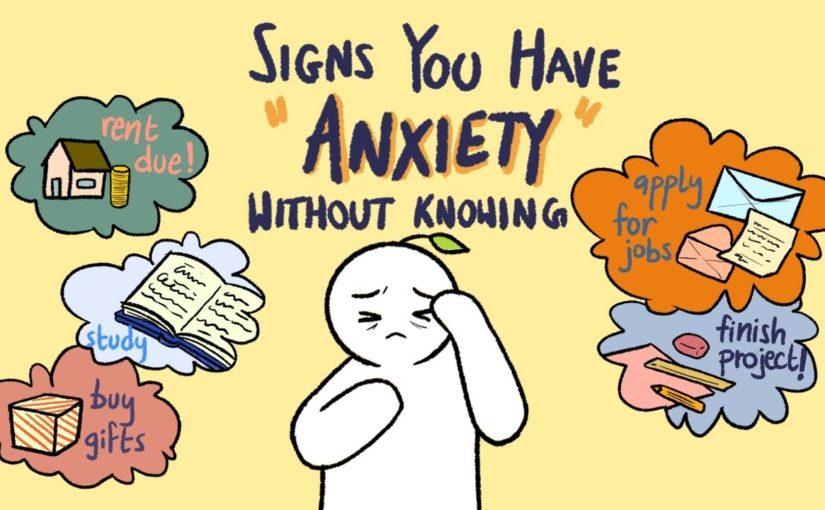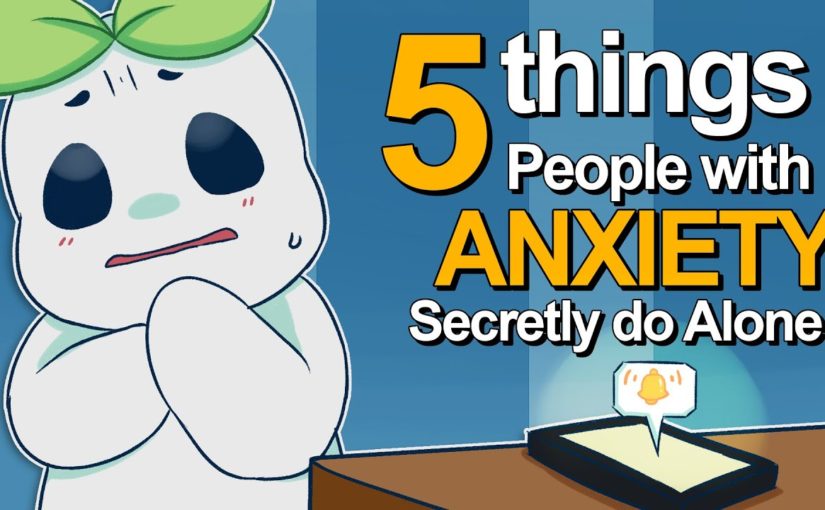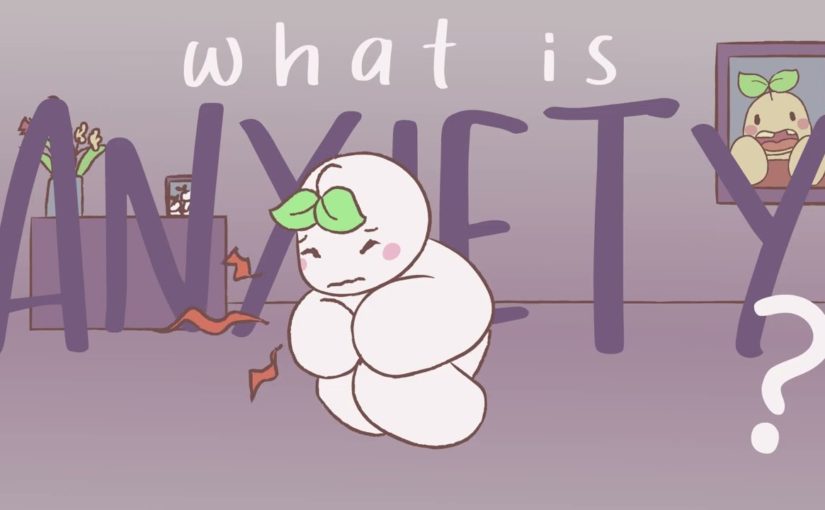Tag: anxiety signs
7 Signs It Might Be Anxiety
 Research also found connections
between anxiety disorders and changes in a person’s sleep cycles. When you’re anxious and
ruminate before sleep, this affects rapid eye
movement or REM sleep, which may induce more unsettling dreams and result in a higher likelihood
of sleeping disruptions. Having nightmares during sleep may also reinforce a negative association between dread and sleep. Number four. You use fear language. Do a lot of your sentences start with, “I’m concerned, I’m
afraid, or I’m worried?” According to a licensed
clinical psychologist, Alicia H. Clark, PsyD PLLC, “The regular use of such phrases “may indicate a deeper problem. “Even though it may sound normal, “sometimes this fear language
can be a sign of anxiety “that is most often brushed off.” Number five. You’re not able to sit still. Can you be still when you’re sitting down? Perhaps you can’t help but tap your foot or scrum around in your chair. According to Dr. Clark, being restless and unable to sit still can be a subtle sign of anxiety. However, it’s important to note that being unable to sit still can also be a classic example of attention deficit
hyperactivity disorder, ADHD, since sitting down is an
under-stimulating task that is unrewarding to the brain. Number six. You apologize excessively. Do you say sorry a lot? Another sign of anxiety
is when a word of apology comes too often and easily, even when it’s not your fault or when it’s out of your control. With anxiety, you may find yourself still over-apologizing for the situation. According to Dr. Juliana Breines, an Assistant Professor of Psychology at the University of Rhode Island, “If you’re always hard on yourself “and have a tendency to
beat yourself up for things, “then it’s likely “you’ll also tend to over-apologize.” And number seven, you
forget important details. Are you always told off for
overlooking small details and making small mistakes? Sometimes, when you have anxiety, you may feel overwhelmed with thoughts, such as about how things may go wrong that you end up not paying attention to the things happening around you. This can make you overlook crucial moments in detail that are important. So if you find yourself
missing important details or forgetting crucial
information a lotta the time, it may be a sign of anxiety. What do you do when you’re anxious? Let us know in the comments below. If you found this video helpful, be sure to like, subscribe, and share this video with those
who might benefit from it, and don’t forget to hit
the notification bell icon to get notified whenever
Psych2Go posts a new video. The references and
studies used in this video are added in the description below. Thanks for watching and we’ll
see you in the next one. (lighthearted music).As found on YouTubeExplaindio Agency Edition FREE Training How to Create Explainer Videos & SELL or RENT them! Join this FREE webinar | Work Less & Earn More With Explaindio AGENCY EDITION
Research also found connections
between anxiety disorders and changes in a person’s sleep cycles. When you’re anxious and
ruminate before sleep, this affects rapid eye
movement or REM sleep, which may induce more unsettling dreams and result in a higher likelihood
of sleeping disruptions. Having nightmares during sleep may also reinforce a negative association between dread and sleep. Number four. You use fear language. Do a lot of your sentences start with, “I’m concerned, I’m
afraid, or I’m worried?” According to a licensed
clinical psychologist, Alicia H. Clark, PsyD PLLC, “The regular use of such phrases “may indicate a deeper problem. “Even though it may sound normal, “sometimes this fear language
can be a sign of anxiety “that is most often brushed off.” Number five. You’re not able to sit still. Can you be still when you’re sitting down? Perhaps you can’t help but tap your foot or scrum around in your chair. According to Dr. Clark, being restless and unable to sit still can be a subtle sign of anxiety. However, it’s important to note that being unable to sit still can also be a classic example of attention deficit
hyperactivity disorder, ADHD, since sitting down is an
under-stimulating task that is unrewarding to the brain. Number six. You apologize excessively. Do you say sorry a lot? Another sign of anxiety
is when a word of apology comes too often and easily, even when it’s not your fault or when it’s out of your control. With anxiety, you may find yourself still over-apologizing for the situation. According to Dr. Juliana Breines, an Assistant Professor of Psychology at the University of Rhode Island, “If you’re always hard on yourself “and have a tendency to
beat yourself up for things, “then it’s likely “you’ll also tend to over-apologize.” And number seven, you
forget important details. Are you always told off for
overlooking small details and making small mistakes? Sometimes, when you have anxiety, you may feel overwhelmed with thoughts, such as about how things may go wrong that you end up not paying attention to the things happening around you. This can make you overlook crucial moments in detail that are important. So if you find yourself
missing important details or forgetting crucial
information a lotta the time, it may be a sign of anxiety. What do you do when you’re anxious? Let us know in the comments below. If you found this video helpful, be sure to like, subscribe, and share this video with those
who might benefit from it, and don’t forget to hit
the notification bell icon to get notified whenever
Psych2Go posts a new video. The references and
studies used in this video are added in the description below. Thanks for watching and we’ll
see you in the next one. (lighthearted music).As found on YouTubeExplaindio Agency Edition FREE Training How to Create Explainer Videos & SELL or RENT them! Join this FREE webinar | Work Less & Earn More With Explaindio AGENCY EDITION
Generalized Anxiety Disorder (SYMPTOMS)
 It’s Interfering with your life or you cannot control your worry or anxiety Anymore the earlier you seek help the easier It may be to treat your generalized anxiety Disorder if you need help or you think you’re suffering with generalized anxiety disorder There’s a link in the description box down below where you can speak to someone Immediately and begin to get the help you need and deserve the link is in the description box down below I would highly recommend you go there at the end of this video the causes of generalized anxiety disorder Could be because of biological and environmental factors which may include genetics differences in brain chemistry and function development and Personality or differences in the way threats are perceived generalized anxiety disorder also often occurs with other mental health conditions Which can include phobias panic disorder post-traumatic stress disorder obsessive compulsive disorder and depression Please do not self-diagnose yourself from this video If you have some of the symptoms we have gone over together in this video or you think you are suffering from generalized anxiety disorder Please seek professional help immediately You can see a doctor and to health professional or click the link in the description box down below Where you can speak to someone immediately who can help you? Please do not self-diagnose yourself from this video I now want you to guess how many times I said Generalized anxiety disorder in this video and comment in the comment section down below Your answer or your guess the winner will win an authentic mental health t-shirt I will reveal the winner on Twitter on December the 10th So make sure you’re following us on Twitter so I can contact the winner. Good luck I said generalized anxiety disorder a lot in this video Have you ever been diagnosed with generalized anxiety disorder before? What symptoms do you experience? And how does it affect your life? Let me and others know in the comment section down below. If you’ve enjoyed this video found it useful and helpful Please give this video a like and let other people know they are not alone going through this and they are not alone Suffering from generalized anxiety disorder. Take care guys and girls. I’ll see you all again in another video.As found on YouTubeAnxiety disorders, phobias, and chronic panic attacks affect millions of people all over the world. Often, treatment consists of medications used to reduce anxiety, but these medications don’t work for everyone. Many people are too afraid to explore the real reason why they have anxiety or they’re too embarrassed to seek medical attention. Instead, they suffer for years struggling to learn how to cope with this condition, alone. More often than not this results in the person avoiding many of the places and activities they once loved because they’re so afraid they’ll have a panic attack in public. If you’re tired of trying new medications that don’t work or you’re looking for an all-natural approach to anxiety treatment, the 60 Second Panic Solution program can help.
It’s Interfering with your life or you cannot control your worry or anxiety Anymore the earlier you seek help the easier It may be to treat your generalized anxiety Disorder if you need help or you think you’re suffering with generalized anxiety disorder There’s a link in the description box down below where you can speak to someone Immediately and begin to get the help you need and deserve the link is in the description box down below I would highly recommend you go there at the end of this video the causes of generalized anxiety disorder Could be because of biological and environmental factors which may include genetics differences in brain chemistry and function development and Personality or differences in the way threats are perceived generalized anxiety disorder also often occurs with other mental health conditions Which can include phobias panic disorder post-traumatic stress disorder obsessive compulsive disorder and depression Please do not self-diagnose yourself from this video If you have some of the symptoms we have gone over together in this video or you think you are suffering from generalized anxiety disorder Please seek professional help immediately You can see a doctor and to health professional or click the link in the description box down below Where you can speak to someone immediately who can help you? Please do not self-diagnose yourself from this video I now want you to guess how many times I said Generalized anxiety disorder in this video and comment in the comment section down below Your answer or your guess the winner will win an authentic mental health t-shirt I will reveal the winner on Twitter on December the 10th So make sure you’re following us on Twitter so I can contact the winner. Good luck I said generalized anxiety disorder a lot in this video Have you ever been diagnosed with generalized anxiety disorder before? What symptoms do you experience? And how does it affect your life? Let me and others know in the comment section down below. If you’ve enjoyed this video found it useful and helpful Please give this video a like and let other people know they are not alone going through this and they are not alone Suffering from generalized anxiety disorder. Take care guys and girls. I’ll see you all again in another video.As found on YouTubeAnxiety disorders, phobias, and chronic panic attacks affect millions of people all over the world. Often, treatment consists of medications used to reduce anxiety, but these medications don’t work for everyone. Many people are too afraid to explore the real reason why they have anxiety or they’re too embarrassed to seek medical attention. Instead, they suffer for years struggling to learn how to cope with this condition, alone. More often than not this results in the person avoiding many of the places and activities they once loved because they’re so afraid they’ll have a panic attack in public. If you’re tired of trying new medications that don’t work or you’re looking for an all-natural approach to anxiety treatment, the 60 Second Panic Solution program can help.
6 Signs of Anxiety That Often Go Unnoticed
 Adrenaline helps you
redirect your blood flow so that most of it is sent
to your vital organs, like your heart and lungs. Consequently, your extremities
start to feel cold. Number four is irritability. Do you easily become irritated? Irritability is a common sign of anxiety. However, it’s a symptom we
often overlook or ignore. It’s a sign that you’re
overwhelmed with stress. Anxiety is associated
with hypersensitivity, meaning that you’ll be much more sensitive to your surroundings, which may cause you to feel
more irritated than usual. Number five is impulsive buying. Another sign of anxiety is impulsivity. In this case, impulse buying. However, impulsivity can manifest itself in many ways, such
as engaging in risky behavior. Impulsivity because of anxiety can be due to numerous factors. The main one is that your
orbital frontal cortex, another branch of your
limbic system, is affected. Studies found that anxiety
increases the blood flow to that region, which
consequently, increases activity. An increase in activity can lead to either impulse control issues,
hoarding, or impulse spending. Additionally, anxiety affects
your prefrontal cortex and makes it harder for you to make wise and thoughtful decisions. Impulse buying, as well as hoarding, are also forms of self-soothing. They provide a false sense
of comfort and security. If you do find yourself caving in and taking financial risks, please consider reaching
out to a therapist for help. And number six, crying easily. When was the last time you cried? One last sign that goes
unnoticed is crying easily. Inexplicably bouts of crying can mean you’re overwhelmed by the
situation you find yourself in. Not only can it be because
of a sensitivity to stress, but it can also be due to
your fight or flight response. The correct terminology is
fight, flight, or freeze. Feeling stuck or freezing
amidst a perceived threat can progress these overwhelming
feelings of stress. When you find yourself crying, attempt to relax by taking a deep breath. Then allow yourself to cry. Crying can release all of those feelings you may be holding onto. It may be great to find
additional ways to self-soothe when you’re feeling anxious as well. So have you experienced
any of these signs? I have. What are some self-soothing
behaviors that help you? I enjoy walking. Feel free to let us know
in the comments below. Anxiety is quite common
and can be manageable. If you ever need help or guidance reaching out to a therapist
or mental health professional can be a good idea. Feel free to like and share
this video if it helped you, or if you think it
could help someone else. Don’t forget to hit the subscribe button and notification bell icon
for more videos like this. And thanks for reading, take care.As found on YouTubeNatural Synergy $47.⁰⁰ New Non-Invasive Alternative. To Electro-Acupuncture, Producing Astounding Results… Self-Application Is Easy, Rapid Response. You’re about to discover how both chronic and acute pain, skin conditions, migraines, and hundreds of ailments all stem from the same root cause ꆛ Yin Yang Ailments🗯 such as➯➱ ➫ ➪➬ Chronic pain immunity⇝Chronic acid reflux⇝High blood pressure⇝Addictions⇝Fibromyalgia⇝Allergies⇝Osteoarthritis⇝Headaches⇝Low back⇝pain Asthma⇝Headaches⇝Depression and anxiety⇝Urinary problems… to name just a few…
Adrenaline helps you
redirect your blood flow so that most of it is sent
to your vital organs, like your heart and lungs. Consequently, your extremities
start to feel cold. Number four is irritability. Do you easily become irritated? Irritability is a common sign of anxiety. However, it’s a symptom we
often overlook or ignore. It’s a sign that you’re
overwhelmed with stress. Anxiety is associated
with hypersensitivity, meaning that you’ll be much more sensitive to your surroundings, which may cause you to feel
more irritated than usual. Number five is impulsive buying. Another sign of anxiety is impulsivity. In this case, impulse buying. However, impulsivity can manifest itself in many ways, such
as engaging in risky behavior. Impulsivity because of anxiety can be due to numerous factors. The main one is that your
orbital frontal cortex, another branch of your
limbic system, is affected. Studies found that anxiety
increases the blood flow to that region, which
consequently, increases activity. An increase in activity can lead to either impulse control issues,
hoarding, or impulse spending. Additionally, anxiety affects
your prefrontal cortex and makes it harder for you to make wise and thoughtful decisions. Impulse buying, as well as hoarding, are also forms of self-soothing. They provide a false sense
of comfort and security. If you do find yourself caving in and taking financial risks, please consider reaching
out to a therapist for help. And number six, crying easily. When was the last time you cried? One last sign that goes
unnoticed is crying easily. Inexplicably bouts of crying can mean you’re overwhelmed by the
situation you find yourself in. Not only can it be because
of a sensitivity to stress, but it can also be due to
your fight or flight response. The correct terminology is
fight, flight, or freeze. Feeling stuck or freezing
amidst a perceived threat can progress these overwhelming
feelings of stress. When you find yourself crying, attempt to relax by taking a deep breath. Then allow yourself to cry. Crying can release all of those feelings you may be holding onto. It may be great to find
additional ways to self-soothe when you’re feeling anxious as well. So have you experienced
any of these signs? I have. What are some self-soothing
behaviors that help you? I enjoy walking. Feel free to let us know
in the comments below. Anxiety is quite common
and can be manageable. If you ever need help or guidance reaching out to a therapist
or mental health professional can be a good idea. Feel free to like and share
this video if it helped you, or if you think it
could help someone else. Don’t forget to hit the subscribe button and notification bell icon
for more videos like this. And thanks for reading, take care.As found on YouTubeNatural Synergy $47.⁰⁰ New Non-Invasive Alternative. To Electro-Acupuncture, Producing Astounding Results… Self-Application Is Easy, Rapid Response. You’re about to discover how both chronic and acute pain, skin conditions, migraines, and hundreds of ailments all stem from the same root cause ꆛ Yin Yang Ailments🗯 such as➯➱ ➫ ➪➬ Chronic pain immunity⇝Chronic acid reflux⇝High blood pressure⇝Addictions⇝Fibromyalgia⇝Allergies⇝Osteoarthritis⇝Headaches⇝Low back⇝pain Asthma⇝Headaches⇝Depression and anxiety⇝Urinary problems… to name just a few…
5 Subtle Signs You Have Anxiety But Don’t Know About It
 this could be a subtle sign you have anxiety as rumination is common in people with generalized anxiety disorder but it may have other causes because it’s not specific to early anxiety so did you relate to any of these points whether you have anxiety or not it can be beneficial to take note of these subtle signs and reflect on what may be causing them remember that feeling anxious is nothing to be ashamed of and you can always reach out for support when you feel you need it now we want to hear from you safe2goers have you experienced any of these signs of anxiety what’s your experience with anxiety share in the comments below as usual all references used are in the description below if you found this video helpful please leave a like and share it with a friend until next timeAs found on YouTubeFunnelify you will be able to create high-quality converting leads pages, affiliate pages, sales pages, sales funnels, and business pages, and you will never need to pay a web designer again.
this could be a subtle sign you have anxiety as rumination is common in people with generalized anxiety disorder but it may have other causes because it’s not specific to early anxiety so did you relate to any of these points whether you have anxiety or not it can be beneficial to take note of these subtle signs and reflect on what may be causing them remember that feeling anxious is nothing to be ashamed of and you can always reach out for support when you feel you need it now we want to hear from you safe2goers have you experienced any of these signs of anxiety what’s your experience with anxiety share in the comments below as usual all references used are in the description below if you found this video helpful please leave a like and share it with a friend until next timeAs found on YouTubeFunnelify you will be able to create high-quality converting leads pages, affiliate pages, sales pages, sales funnels, and business pages, and you will never need to pay a web designer again.
 FunnelMates $46.⁹⁵ AFFILIATE MASTERY BONUS: 6-Week LIVE Series Has Begun! Replays are Instantly Available.Want A Profitable Mailing List But Not Sure Where To Begin? We’ll Guide You, Equip You & Even PAY You Cash To Do It!5-10 Minutes A Day Using Automation Software & Our Time-Tested StrategySee How Your New Site Can Be Live In Just 27 Seconds From Now!“Today You’ll Get Access To The Complete FunnelMates Suite, Traffic Automation Software Tools & Our Beginner Friendly 6 Week Affiliate Masterclass (Inc. Recordings) Responsible For Taking 1,000 Of Complete Affiliate Zeroes To Legendary Affiliate Marketing Hero’s”FunnelMates Is The FIRST EVER
System That Simplifies List-Building Affiliate Funnels
To Something Anyone Can UseIn Fact … On Average, Out Of Every 100 People Who Visit On Your Pages3% are ready to buy 30% don’t think they’re interested
6-7% are open to the idea 30% KNOW they’re not interested
6-7% are open to the ideaLong Story Short, 97% Of People
Just Aren’t Ready To Buy From You Right Now…
FunnelMates $46.⁹⁵ AFFILIATE MASTERY BONUS: 6-Week LIVE Series Has Begun! Replays are Instantly Available.Want A Profitable Mailing List But Not Sure Where To Begin? We’ll Guide You, Equip You & Even PAY You Cash To Do It!5-10 Minutes A Day Using Automation Software & Our Time-Tested StrategySee How Your New Site Can Be Live In Just 27 Seconds From Now!“Today You’ll Get Access To The Complete FunnelMates Suite, Traffic Automation Software Tools & Our Beginner Friendly 6 Week Affiliate Masterclass (Inc. Recordings) Responsible For Taking 1,000 Of Complete Affiliate Zeroes To Legendary Affiliate Marketing Hero’s”FunnelMates Is The FIRST EVER
System That Simplifies List-Building Affiliate Funnels
To Something Anyone Can UseIn Fact … On Average, Out Of Every 100 People Who Visit On Your Pages3% are ready to buy 30% don’t think they’re interested
6-7% are open to the idea 30% KNOW they’re not interested
6-7% are open to the ideaLong Story Short, 97% Of People
Just Aren’t Ready To Buy From You Right Now…5 Things People With Anxiety Secretly Do Alone
– Hey Psych2Goers, welcome back. Think you've never experienced anxiety before? Well, you might not have realized it because people experience anxiety in different ways. Your idea of anxiety might not align with how you experience it. And you may not notice anxiety in someone who grapples with it privately. So, it's important to remember to always be kind because you can never know what others are struggling with when they're alone. If you're dealing with anxiety, know that you're not alone in facing these challenges. Anxiety is a normal part of life.
It alerts us to dangers and helps us prepare for a wide variety of situations. But according to the Diagnostic and Statistical Manual of Mental Disorders, DSM, anxiety becomes a disorder when it starts to impact daily functioning and different aspects of life. With that said, here are five things people with anxiety secretly do alone. Number one, overthink, overthink, and overthink. Anxiety disorders are characterized by excessive or disproportionate worry and fear that gets in the way of daily activities. It may not be as obvious to other people, but those who struggle with anxiety tend to overthink while in the presence of others and when alone. Many people who struggle with anxiety tend to dwell on negative thoughts about themselves and their past. They may replay these past events in their head over and over, trying to think of what they could have done differently.
And may also imagine possible future events to try and anticipate things that might go wrong. Two, confine themselves to their comfort zone. Everyone feels anxious now and then, but those struggling with an anxiety disorder constantly adjust their lives to cater to it. They may stick to activities that calm their racing thoughts, or engage in pursuits that allow them to avoid the things that make them feel anxious instead of choosing activities purely for fun or interest. Like re-watching the same shows over and over because they don't have to feel anxious anticipating what might happen next. Some people may not even be able to leave the house out of fear of being in places and situations where escape may be difficult.

Or they may struggle to leave the house without a certain person they're scared to lose. Three, withdraw from social interaction. Some people with anxiety may have a limited social life and turn down invites, not out of a lack of interest, but to stay home to calm certain worries and fears. In some cases, the person may seem uninterested in spending time with others due to a crippling fear of feeling humiliated, rejected, or looked down on in social interactions. People with anxiety may withdraw socially to cope with their fears and might avoid their phones or ignore or turn off their notifications to manage their feelings of anxiety, and then feel overwhelmed and anxious later when they see the backlog of messages. Number four, procrastinate or struggle to finish tasks. People with anxiety, especially high functioning anxiety, may seem like completely put together achievers, but they may also grapple with getting their work done when they're alone, because anxious thoughts may force them to procrastinate.
Anxiety also affects working memory, which makes it difficult to focus long enough to complete tasks. And so, they may then have to rush to get things done on time, adding extra stress. Then number five, tossing and turning in bed. Having anxiety doesn't immediately translate to nervous, jittery energy that others can easily detect. Someone with anxiety can seem calm and rested, when in reality, they might be tossing and turning at night, unable to fall asleep because of their anxious thoughts. If they do manage to get some sleep, they might be restless or riddled with nightmares about their anxieties. For example, those with separation anxiety disorder may have nightmares about being separated from their loved ones. Anxiety disorders are complex and varied, but remember that a certain level of anxiety is normal and anxiety disorders are those that cause significant distress or impairment in different areas of life.
If you or anyone you know, are struggling with an anxiety disorder, please don't hesitate to reach out to a qualified mental health care provider. Can you relate to any of these signs? Share with us in the comments and remember to like and share this video with someone who might benefit too. As always the references and studies used are listed in the description below. Until next time, take care friends..
As found on YouTube
6 Physical Symptoms that Might Be Anxiety
 We all have phobias whether
they developed during childhood or are the result of a bad experience. Phobias are our brain’s way of
trying to keep us from harm. However, some phobias are
the results of anxiety and can become obstacles
in your daily life. Technically phobias are
categorized as anxiety disorders and fall into two groups;
specific and complex. Specific phobias usually
stem from a bad experience, but complex phobias stem from
mental or emotional distress. Specific phobias usually
don’t need treatment but complex phobias, like agoraphobia, the fear of being in busy
places, and social phobia do. These phobic opioids can
make you feel more alone and can also affect your self-esteem. Number four, attacks, trouble breathing. A telltale sign of anxiety is
experiencing a panic attack or anxiety attack. Though both terms are
used interchangeably, they’re different. A panic attack is a sudden
overwhelming surge of emotion such as fear and discomfort. You may feel your chest tighten as your breathing has stopped. You may also feel dizzy or lightheaded. While anxiety attacks
have similar symptoms, they’re a bit different as
they’re the result of symptoms that have been gradually building up. Number five is gastrointestinal disruptions. Gastrointestinal issues
are another sign of anxiety but can also arise independently
of your mental health. While anxiety and gastro
illnesses are mutually exclusive, there is research supporting the theory that anxiety causes
gastrointestinal disorders such as irritable bowel syndrome and studies have shown the comorbidity between anxiety and
irritable bowel syndrome. There’s lots of research that treatment for some gastrointestinal
disorders may involve therapy. And number six, physiological strangeness. A final sign that you’re
experiencing anxiety is if you feel tingling or numbness usually in your face and limbs, which is the feeling of blood
rushing to your extremities as your fight or flight response kicks in. While blood rushes to our extremities, other areas of your body can feel weak. Tingling and numbing can also
be caused by hyperventilation which indirectly happens
when you’re anxious. Along with the symptoms
listed in this article, there are other ways
anxiety can manifest itself. Despite its symptoms,
anxiety is manageable. Please reach out to a
medical health professional or a therapist for help. Do you recognize any of
these symptoms in yourself? Let us know when the comments are below. And remember to like and share this video with those who might benefit. As always, the references and studies used are listed in the description below. Take care and thanks for watching. See you next time.As found on YouTubeHi, My name is James Gordon 👻🗯 I’m going to share with you the system I used to permanently cure the depression that I struggled with for over 20 years. My approach is going to teach you how to get to the root of your struggle with depression, with NO drugs and NO expensive and endless therapy sessions. If you’re ready to get on the path to finally overcome your depression, I invite you to keep reading…
We all have phobias whether
they developed during childhood or are the result of a bad experience. Phobias are our brain’s way of
trying to keep us from harm. However, some phobias are
the results of anxiety and can become obstacles
in your daily life. Technically phobias are
categorized as anxiety disorders and fall into two groups;
specific and complex. Specific phobias usually
stem from a bad experience, but complex phobias stem from
mental or emotional distress. Specific phobias usually
don’t need treatment but complex phobias, like agoraphobia, the fear of being in busy
places, and social phobia do. These phobic opioids can
make you feel more alone and can also affect your self-esteem. Number four, attacks, trouble breathing. A telltale sign of anxiety is
experiencing a panic attack or anxiety attack. Though both terms are
used interchangeably, they’re different. A panic attack is a sudden
overwhelming surge of emotion such as fear and discomfort. You may feel your chest tighten as your breathing has stopped. You may also feel dizzy or lightheaded. While anxiety attacks
have similar symptoms, they’re a bit different as
they’re the result of symptoms that have been gradually building up. Number five is gastrointestinal disruptions. Gastrointestinal issues
are another sign of anxiety but can also arise independently
of your mental health. While anxiety and gastro
illnesses are mutually exclusive, there is research supporting the theory that anxiety causes
gastrointestinal disorders such as irritable bowel syndrome and studies have shown the comorbidity between anxiety and
irritable bowel syndrome. There’s lots of research that treatment for some gastrointestinal
disorders may involve therapy. And number six, physiological strangeness. A final sign that you’re
experiencing anxiety is if you feel tingling or numbness usually in your face and limbs, which is the feeling of blood
rushing to your extremities as your fight or flight response kicks in. While blood rushes to our extremities, other areas of your body can feel weak. Tingling and numbing can also
be caused by hyperventilation which indirectly happens
when you’re anxious. Along with the symptoms
listed in this article, there are other ways
anxiety can manifest itself. Despite its symptoms,
anxiety is manageable. Please reach out to a
medical health professional or a therapist for help. Do you recognize any of
these symptoms in yourself? Let us know when the comments are below. And remember to like and share this video with those who might benefit. As always, the references and studies used are listed in the description below. Take care and thanks for watching. See you next time.As found on YouTubeHi, My name is James Gordon 👻🗯 I’m going to share with you the system I used to permanently cure the depression that I struggled with for over 20 years. My approach is going to teach you how to get to the root of your struggle with depression, with NO drugs and NO expensive and endless therapy sessions. If you’re ready to get on the path to finally overcome your depression, I invite you to keep reading…
